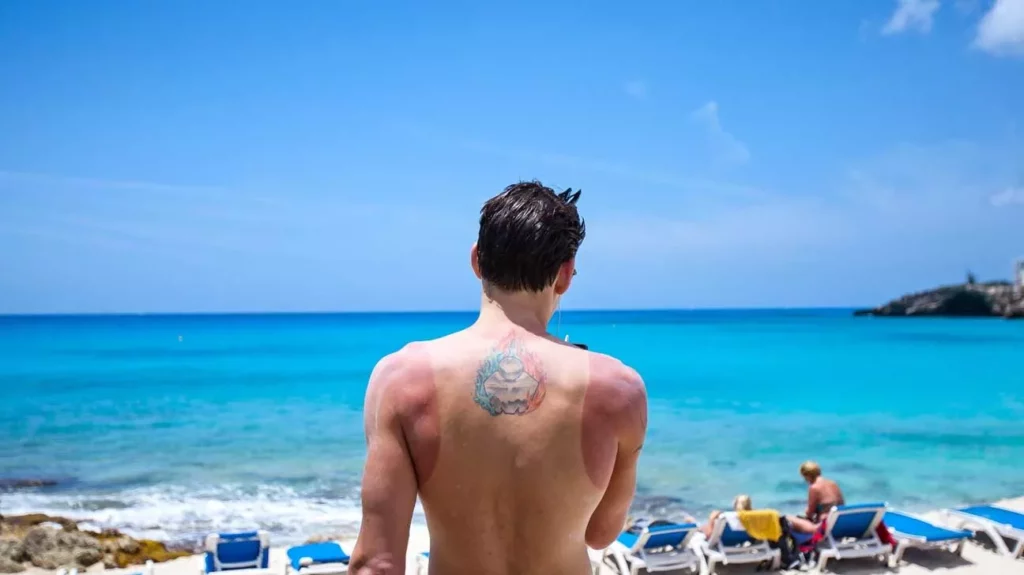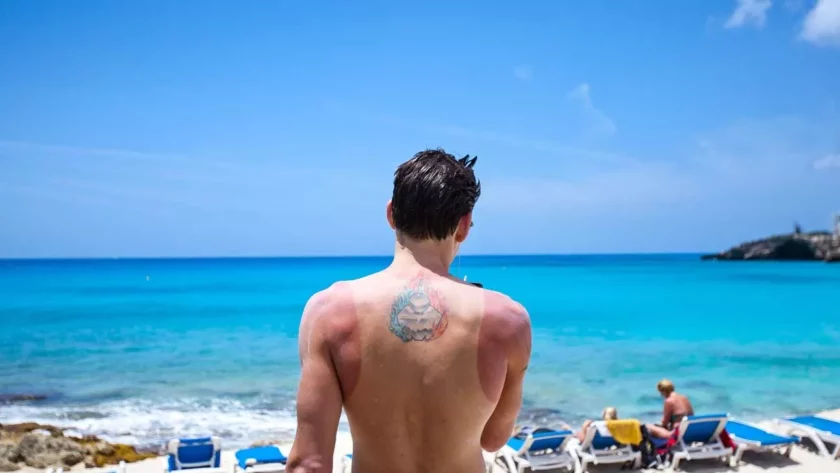What is tanning?
Contents
Tanning commonly occurs under the sun (UV) light exposure, when skin color becomes darkened, or tanning.
However, natural sunlight or artificial UV radiation also deliver the same frequencies of UVA, UVB, and a combination of both.
Artificial light sources, such as tanning lamps.
However, using sun cream products without exposure to sunlight or UV radiation can also produce a tanning effect, known as sunless tanning.
Sufficient sunlight exposure is a good source of vitamin D, which is essential for our bones healthy, and other body organs.
Check – What Is Light Therapy? How Does It Work? Pros, And Cons
We have also heard of sunburn, so what is sunburn? how is it different from tanning?

Difference Between Tanning and Sunburn?
Tanning is different from sunburn, here we go:
| Tanning | Sunburn |
| Tanning begins when UV light hit your skin and leaves behind invisible mutations, where the body produces extra melanin. | Sunburn happens when the DNA of our skin cells has been damaged by too much UV radiation. |
| Basically, it is a result of melanin (which protects your skin from further skin damage, by giving your skin a darker color). | It is a kind of inflammation that symptoms – blistering, swelling, rash, and peeling skin, and is caused by damage from UV rays. |
| Skin specialists said that just sunburn and regular tanning can leads to premature aging and risk of skin cancer. | Over time sunburned is dangerous and causes damaged cells may also lead to premature aging and skin cancer. |
Why does tanning affect skin more in water?
I recently checked this when I went to the pool, where I saw my wet skin become more tanned than normal under the sun, but why?
First, no skin needs to be exposed to direct sunlight to tan or burn.
Water filters the longer wavelengths first like red, and shorter wavelengths are last to go, blue and UV.
Water is a fairly good absorber of UV light that causes tanning, However, it is not a substitute for long UV protection.
NOTE: Basically, water or water droplets on the skin act as a lens, focusing the sunlight onto your skin.
As the result, this skin tries to prevent further injury by producing melanin (a substance that gives skin its color).
And the more melanin your skin produces, the darker your skin, also hair, and eyes color will be.
Movement in the water is effective and can rinse UV protection creams off your skin.
So you don’t get that much protection in clear water or near the surface, also the deeper you go, the less sun you get.
NOTE: Ocean water has very little more absorption than “pool” water, and white skin people are more chances of tanning.
Risk of excessive tanning
According to the dermatologist Dr. Geetika Mittal Gupta, fair skin types never tan, they just burn, and redness on exposure.
Not just sunburn is dangerous, but regular tanning also leads to premature aging and increases the risk of skin cancer (2) (3) (4).
A history of sunburn increased the risk of developing both BCC (basal cell carcinoma) and SCC (Squamous cell carcinoma) (5).
However, moderate sun exposure is also good for bone health, but not overdo it.
If a person has a vitamin D deficiency which has been associated with an increased risk of other health issues (6) (7) including:
- several types of cancer
- heart disease
- autoimmune disease
- bone disease
Tanning in different skin types
A person’s different skin types and their reaction to sun exposure are individuals.
| Skin color | sunburn | tanning behavior | von Luschan scale (measurement of skin color) |
| light skin | often | always burns, always peels don’t tan | 1-5 |
| light-skinned | usually | burns and peels often, tans poorly | 6-10 |
| Light intermediate | rarely | tans after burning | 11-15 |
| dark intermediate | rarely | rarely burns, tans easily | 16-21 |
| dark brown skin | No | rarely burns, tans darkly easily | 22-28 |
| black skin type | No | Naturally black-brown skin | 29-36 |
Precautions
It’s not like you can’t go to the sun. go in sunlight but long for long. and after getting sunburned avoid for some days.
Here are some tips that are simple and easy to prevent tanning (8) include:
- Avoid sun exposure during mid-day 1 am to 4 pm
- If you have to go, make sure to wear some protection cloth, an umbrella, a broad cap, and sunglasses.
- Use broad-spectrum sunscreen during sunbath, which works as a shield for your skin
- Keep hydrated your body, so there will be no risk of dehydration.
Sun cream for tanning
You can also use sun cream, but mostly sun cream is whipped in water, but you can use sun cream during normal daytime.
NOTE: Yes, you can use SPF for sunburn, and for tanning SPF with PA +++.
If a person goes into the sun without any protection, then after 10 -15 minutes, their skin will start burning, causing tanning.
Whereas another person, uses SPF 50, then goes to the sun, then SPF 50 gives their skin an additional time about 50 times in order to prevent burning.
Home-remedy for Suntan
There are many home remedies that are good for sun tanning, but here is one home-remedy that is excellent which is:
Face mask or body scrub
- Take 1 big spoon of Gram flour or Besan, then add 1 big spoon of Curd.
- then add little Turmeric, now add 1 Teaspoon, of honey, and add 1/2 teaspoon of sandalwood powder.
- now add 1 tablespoon of rose water or you can also add more water for a body scrub
- mix them thoroughly to make a paste-like consistency
How to apply on skin
- Apply the mixture over the tanned areas, and massage in a circular motion.
- Let the mask do its action for about 20-30 minutes
- Finally, wash it off using cool tap water, and you will see the difference in one wash.
BOTTOM LINE
Tanning is a result of melanin (which protects your skin from further skin damage, by giving your skin a darker color).
Water or water droplets on the skin act as a lens, that focuses the sunlight onto your skin, leading to tanning.
Sunburn occurs when the DNA of our skin cells has been damaged by too much UV radiation, which causes skin cancer.




